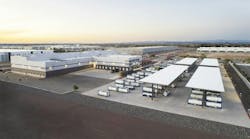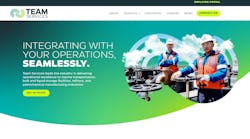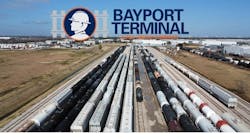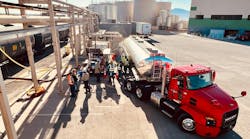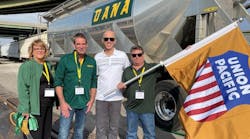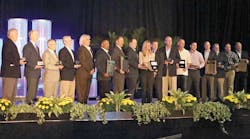SAFETY was a recurring theme throughout the International Liquid Terminals Association’s 36th Annual International Operating Conference. Special guest speakers discussed how tragedy could be just a second away and how safety and success in the workplace takes collaboration, innovation, and execution.
Held May 23-25 in Houston, Texas, this was another well-organized event with a solid turnout for ILTA. This year’s International Operating Conference & Trade Show drew nearly 4,500 participants from around the world. The trade show featured 339 exhibiting companies, including 49 first-time exhibitors.
During the trade show on May 25, ILTA hosted a new Trade Show Symposium featuring sessions that examined coating applications, loading rack technologies and safety equipment, vapor control systems, and terminal automation.
In her opening remarks, ILTA President Melinda Whitney said: “One of the key strengths for ILTA is the input and involvement of our membership in our activities. This is particularly evident at this year’s event as many employees from our terminal and supplier member companies are here. More than 20 conference speakers are from ILTA member companies, and 78% of trade show exhibitors are ILTA supplier members.”
Plenary Speaker Brad Livingston followed Whitney with an inspirational story about the importance of safety in the workplace. Livingston shared his real-life experience of surviving two back-to-back storage tank explosions while performing hot work to repair a pinhole leak on a drip tank at a natural gas well. In sharing his courageous road to recovery, and the key lessons he learned along the way, Livingston captivated the audience and reminded everyone that just a second is all it takes to change a life forever.
Appropriately, one of the first conference sessions following Livingston’s presentation focused on recommended practices for safely preparing a storage tank for hot work. Other conference sessions reviewed safety considerations for floating roof seal inspections and a new benchmarking resource for terminal safety performance.
Peter Williams, Concord Tank Corp, reviewed steps necessary to prepare a storage tank for hot work, and he examined some common mistakes that occur during the process. He also shared examples that resulted in near misses and incidents, and discussed best practices to ensure worker safety.
Jeff Eickhoff, vice president of Americas–HMT LLC, said safety is the most important part of floating roof seal inspections. Nothing is more critical than safety—and that starts with a job hazard analysis (JHA), safe work plan, and job permits.
Every safety plan must include rescue considerations: Who is responsible for the rescue—contractor, host, or third party? Are there other emergency response resources? Before proceeding, the inspection contractor should review the rescue plan to ensure understanding of all elements. Is there a plan for a high-angle rescue that uses devices such as a tripod and pulley system to raise and/or lower the person to safety?
The featured luncheon speaker was Rusty Braziel with RBN Energy. In his presentation, “Going to Mexico! New Opportunities in Mexico’s Oil & Gas Markets,” Braziel said Mexico’s new energy market started on December 20, 2013, when Mexican President Enrique Peña Nieto signed historic constitutional reforms related to Mexico’s energy sector aimed at reversing oil and gas production declines and 75 years of a nationalized market.
On August 11, 2014, secondary laws were passed to implement those reforms and officially open Mexico’s oil, natural gas, and power sectors to private investment. That provides for:
• Maintaining state ownership of subsoil hydrocarbons resources, but allowing companies to take ownership of those resources once they are extracted and to book reserves for accounting purposes.
• Creating four types of contracts for exploration and production in: service contracts, profit-sharing contracts, production-sharing contracts, and licenses.
• Opening refining, transport, storage, natural gas processing, and petrochemicals sectors to private investment.
• Transforming Pemex into an autonomous company.
• Strengthening regulatory agencies.
“Blocks/contracts are awarded to private operators under competitive tender,” Braziel said. “On the downstream side, there’s full liberalization for ownership and operation of natural gas, liquids and products pipelines and terminals by private players. Natural gas transportation business was divested from Pemex into a separate company: CENAGAS. Liquids terminals and pipelines are owned by Pemex subject to a mandatory open season. Marketing business is open to private parties. Both private and federal government-anchored pipeline projects are permitted.
“So it’s a completely different world,” he said. “These are huge changes.”
Nineteen terminal member companies were honored for achieving outstanding safety performance in 2015. The awards were presented May 24 during the 10th Annual ILTA Safety Awards breakfast.
ILTA’s Platinum Safety Award, the liquid terminal industry’s highest safety honor, was presented to two companies for their demonstration of an exemplary safety culture. MIPC received the Platinum Safety Award in the small company category, and CITGO Petroleum Corporation was recognized in the large company category.
This was MIPC’s first time receiving the award, having participated in ILTA’s Annual Safety Survey and Recognition Program since joining the association in 2013. CITGO has participated since the program was founded and previously received the ILTA Platinum Award in 2007, 2012, and 2014.
The Safety Excellence Award was presented to 15 terminal companies that achieved a safety record of less than one injury per 100 workers in 2015, with the incident rate for smaller companies with fewer than 100 FTEs averaged over multiple years, depending on the number of employees. The companies honored are: Arc Terminals Holdings LLC, Benchmark River and Rail Terminals LLC, Demaco Terminal Operations Corp, Intercontinental Terminals Company LLC, Kinder Morgan Energy Partners, Marathon Petroleum Company, Motiva Enterprises, NuStar Energy LP, Odfjell Terminals, Petro-Diamond Terminal Company, Phillips 66 Company, Sunoco Logistics Partners LP, Tesoro Logistics LP, US Venture Inc, and Vecenergy. Marathon Petroleum Company also received the ILTA Five-Year Safety Milestone Award for having achieved and maintained safety excellence every year since 2011.
Two companies earned the ILTA Safety Improvement Award: International-Matex Tank Terminals (IMTT) and South Coast Terminals. To receive this award, a company must demonstrate significant, consistent improvement in safety performance over a three-year period. The company also must show a current total recordable incident rate that is 40% lower than the average of the three prior years.
All award recipients were identified from among the companies that participated in ILTA’s Survey of Terminal Member Safety Data for 2015. This data represents information reported on OSHA’s Form 300A, which is prepared annually in accordance with federal regulatory obligations. Nearly 60% of terminal members participated in this year’s survey. This represents the highest level of participation since the recognition program was founded in 2006. In the first year of the program, 28 member companies participated and 13 were recognized.
The 37th Annual International Operating Conference and Trade Show is scheduled for June 12-14, 2017, in Houston. The conference will take place at the new Marriott Marquis Hotel, and the trade show will be relocated to the north end of the George R Brown Convention Center. ♦



